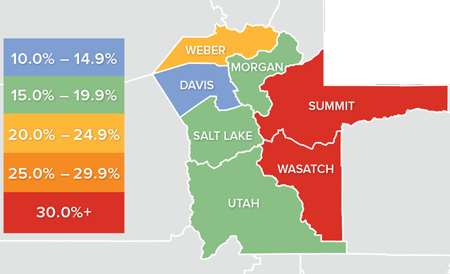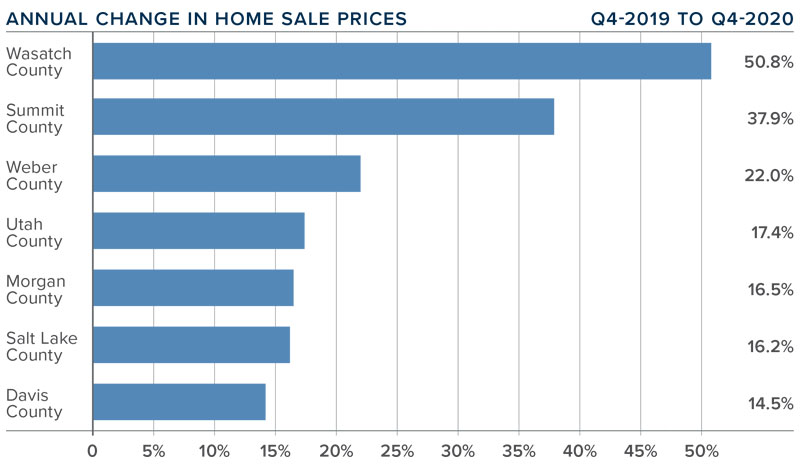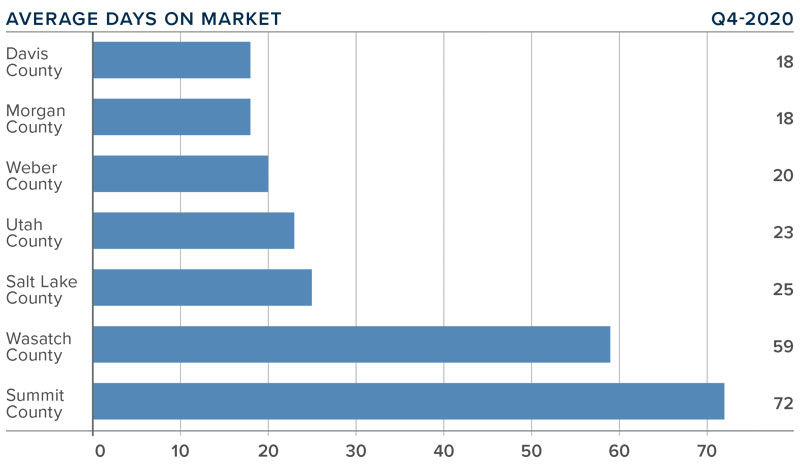The following analysis of select counties of the Utah real estate market is provided by Windermere Real Estate Chief Economist Matthew Gardner. We hope that this information may assist you with making better-informed real estate decisions. For further information about the housing market in your area, please don’t hesitate to contact your Windermere agent.
Regional Economic Overview
The recovery in employment following the very significant job losses in Utah from COVID-19 continues to impress. Of the over 144,000 jobs that were lost in the state, all but 7,800 have returned. With the recovery clearly in place, the unemployment rate, which peaked at 10.4% in April, has dropped as jobs have been recovered and now stands at a very respectable 4.3%. In the third quarter Gardner Report, I mentioned I was a little concerned that rising COVID-19 infection rates might curtail the economic recovery, but the impact thus far has been minimal. I am pleased to see new infection rates starting to drop again and hope this trend will continue.
utah Home Sales
❱ In the final quarter of 2020, 10,237 homes changed hands, representing a solid increase of 14.4% compared to the same period in 2019—a great way to close out this unusual year.
❱ Total sales activity rose in all counties covered by this report other than Morgan. The small counties of Summit and Wasatch saw significant gains.
❱ The number of homes for sale in the quarter was 62.8% lower than during the same period a year ago, which likely frustrated buyers.
❱ Pending sales in the fourth quarter were down 26.3% compared to the third quarter. This is due to a lack of homes for sale and seasonality, so I am not concerned.

utah Home Prices

❱ The average home price in the region continued to rise in the fourth quarter, with a year-over-year increase of a very impressive 27.6% to $512,894. Home prices were also 18.5% higher than in the third quarter of 2020.
❱ Price growth was again influenced by very significant gains in Wasatch County, where average prices jumped from $681,000 to $1.027 million.
❱ Outside of Wasatch County, every county covered by this report saw double-digit price appreciation compared to the same period a year ago.
❱ Home prices are still rising at very significant rates as the economy recovers, supply limitations persist, and mortgage rates remain attractive.

Days on Market
❱ The average number of days it took to sell a home in the counties covered by this report dropped 24 days compared to the final quarter of 2019.
❱ Homes sold fastest in Davis and Morgan counties. The longest time it took to sell a home was in Summit County. It took less time to sell a home in all markets than it did in the fourth quarter of 2019.
❱ During the fourth quarter, it took an average of 34 days to sell a home in the region, down 6 days compared to the third quarter of 2020.
❱ Market time declined due to growing demand and limited supply. I do not see it dropping by much more, as I hope listing inventory will rise in the spring. However, that is far from certain.

Conclusions

This speedometer reflects the state of the region’s real estate market using housing inventory, price gains, home sales, interest rates, and larger economic factors.
The region’s housing market continues to perform very well, with substantial demand for the limited number of available homes. This has led to significant increases in home prices. Although this has been a boon for home sellers, affordability issues are increasing.
I believe we will see the number of listings increase in the spring of 2021, which, in concert with modestly rising mortgage rates, should take some of the heat off the market. For now, though, it remains a staunchly seller’s market. As such, I am moving the needle a little more in their favor.
About Matthew Gardner

As Chief Economist for Windermere Real Estate, Matthew Gardner is responsible for analyzing and interpreting economic data and its impact on the real estate market on both a local and national level. Matthew has over 30 years of professional experience both in the U.S. and U.K.
In addition to his day-to-day responsibilities, Matthew sits on the Washington State Governors Council of Economic Advisors; chairs the Board of Trustees at the Washington Center for Real Estate Research at the University of Washington; and is an Advisory Board Member at the Runstad Center for Real Estate Studies at the University of Washington where he also lectures in real estate economics.
 Facebook
Facebook
 X
X
 Pinterest
Pinterest
 Copy Link
Copy Link



